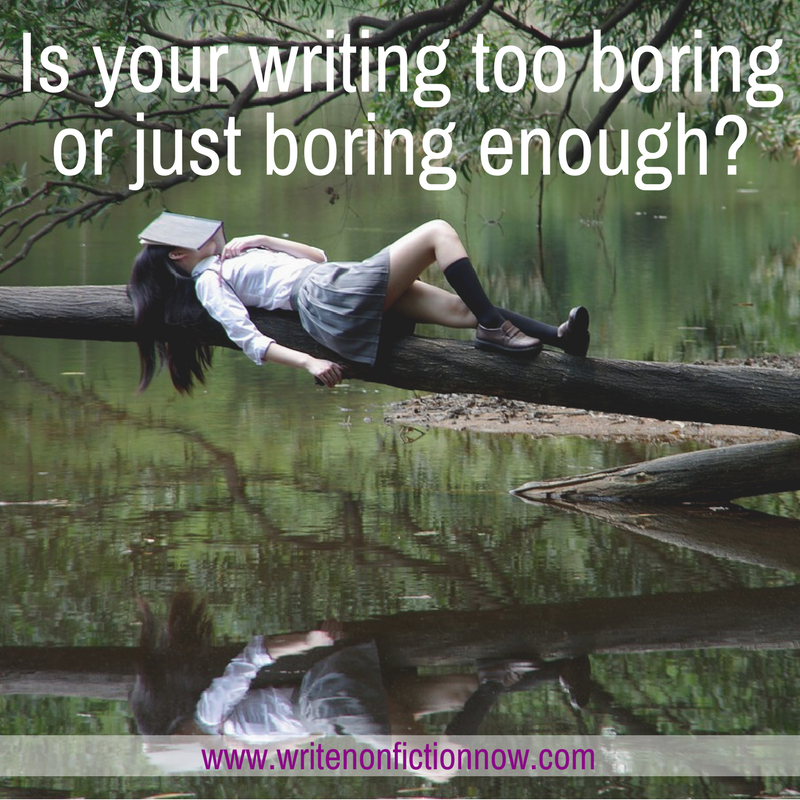Everyone wants their writing to stand out. You don’t want to write just another memoir of moving to New York City; you want to write a unique coming-of-age story. You don’t want to write another profile of a literary figure; you want to write a witty, memorable one.
Having high aspirations is good. Without ambition, most writers wouldn’t be driven to write. Yet, there is a limit to how unique you should try to be when trying to stand out.
You don’t want to be a boring writer, but you do want to make sure you have the right level of boringness in your work so readers don’t get distracted from the important thing—the content.
So, how do you get “just the right” amount of pizzazz in a piece of writing so you don’t stand out in the total wrong way? Here are a few tips.
Don’t try too hard.
If you are working to make your piece unique, you are at high risk of trying too hard. Nothing alienates readers faster than cringe-worthy writing.
If it occurs to you that starting your piece with an anecdote will draw readers in, don’t labor to make it a five-page, richly descriptive narrative masterpiece if it doesn’t come to you naturally. A paragraph might suffice. A belabored narrative opening might do the opposite of what you’re intending and instead drive readers away.
The same goes for humor or trying to be millennial-tech-friendly—if it doesn’t come naturally, it’s better to hold off until it does.
Don’t make things up.
This tip seems like it should be a no-brainer, but you’d be surprised by how many writers resort to stretching the truth to make a story or fact more exciting. While artistic license is sometimes acceptable, especially with memoir, don’t give in to temptation to embellish factual writing or reporting.
If your topic by necessity needs to be exciting, and you just can’t get there, it’s a sign that you might need to do more research or find a new angle. And don’t forget—some topics are meant to be a bit more low-stakes. If you are writing a how-to book, no one is expecting breathtaking narrative.
Work on your execution.
Even the narrowest of subjects can lead to a great book if the form is done cleanly. A well-executed book for its genre can be satisfying for this reason alone. Resist having unwieldy chapters that include every anecdote. Avoid adding excessive layers on top of your narrative, like numerous epigraph quotes or endless interludes between the real chapters.
And follow traditional conventions of good writing. Chapters shouldn’t all begin with ‘This chapter is about…”; the book should have a throughline or thesis that holds it all together.
These basic writing practices are meant to help you transform workmanlike writing into something enjoyable to read—in other words, something that isn’t boring. By focusing on narrative technique and sound structure in the first place, you are already avoiding being boring. Sometimes, simple is the best and most desirable.
Be yourself.
Hunter S. Thompson wrote some pretty crazy nonfiction; his freewheeling style redefined what was possible in the genre of creative nonfiction. He also had it in his will that his ashes should be shot out of a cannon.
What I’m saying here is that Thompson’s unique style came out of his natural way of being. He wasn’t trying to be anyone other than Hunter S. Thompson. The same goes for any nonfiction writer, even if you’re just writing about being vegan rather than embarking on drug-riddled gonzo journalism.
If you write what you actually think and actually would say, and not what you think will be the most entertaining or most like a writer you admire, your writing will invariably be better because it is more grounded and genuine. Readers can smell disingenuousness from miles away.
The best nonfiction writing stands out for only two reasons: it’s well-crafted, and it’s conveying interesting information. Focus on these two things, and your work will stand out without adding on any other bells and whistles. Sometimes it’s better to be the just right amount of boring.
How do you find the balance between too boring and not boring enough? Tell me in a comment below.
About the Author
 C.K. Bush is a nonfiction editor and writer. She lives in New York City.
C.K. Bush is a nonfiction editor and writer. She lives in New York City.
Photo copyright: ivxintong / Pixabay.com

Diane Stephenson says
Thank you for sharing these points. I had never thought about my non-fiction writing in this way. I guess I just write without trying to make it exciting or wondering if it is boring. One of my aims is to make what I write completely clear so the reader doesn’t think I mean something I don’t mean. I am very detailed, but hopefully not overly so. I have read books where I have had to reread sentences or paragraphs several times in order to understand what the writer is saying, or trying to figure out why he/she would say what it sounds as if they are saying. I usually figure it out in the end, but it is a nuisance to have to repeat parts before you can continue reading. I do my best to avoid this in my writing, but I don’t know if I always succeed.
Nina Amir says
Hi, Diane. I’m glad you found the post useful!